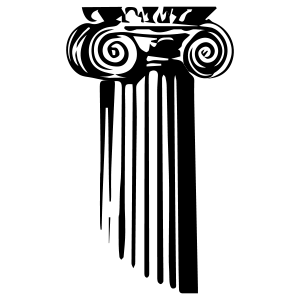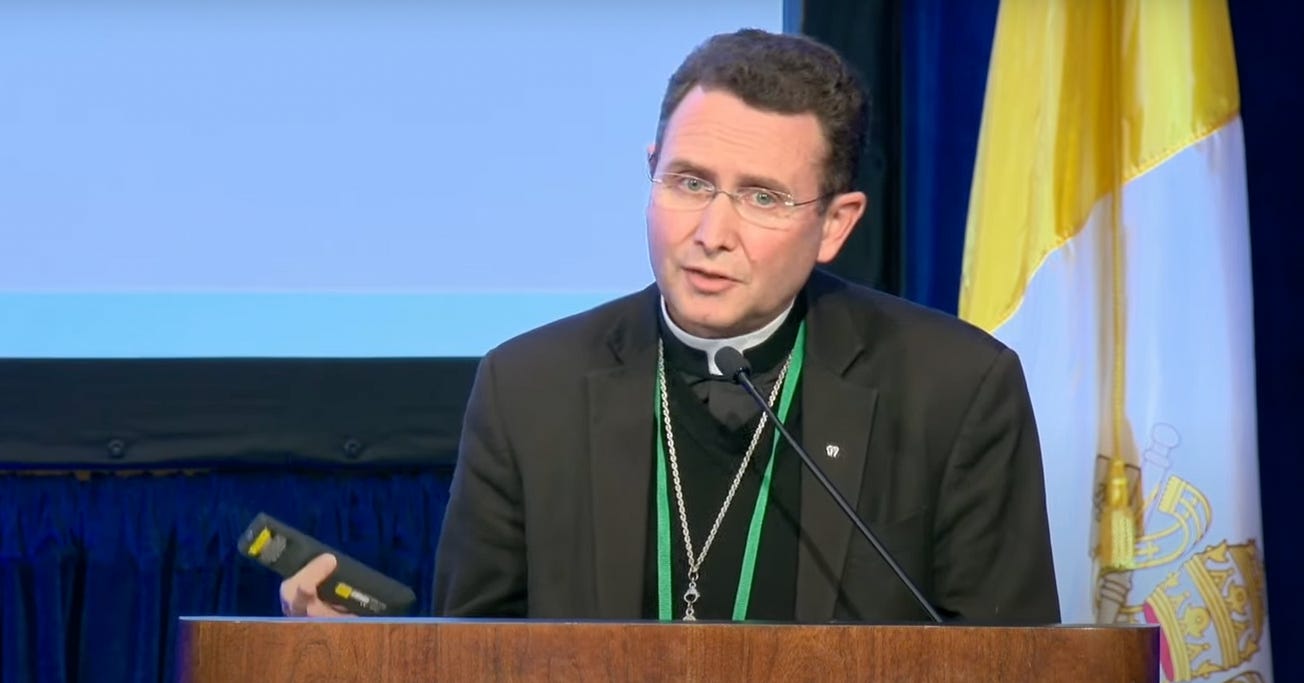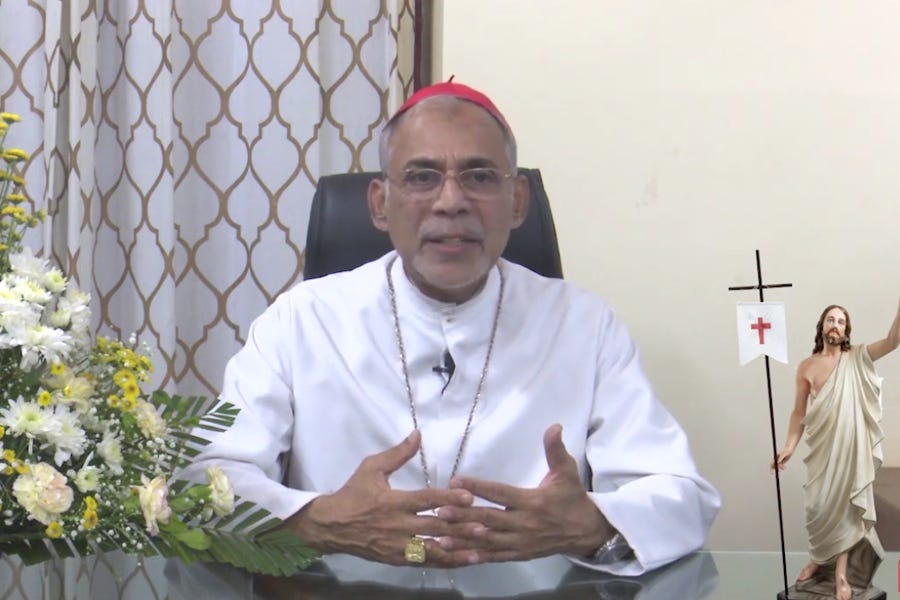Happy Friday friends,
There’s been a lot of news this week.
Quick Links
The nomination was met with a chorus of takes suggesting, variously, that Roche, 71, is about to usher in a new era of progressive liturgical reform, or that he is clearly a place-holder, destined to serve a single term before the newly named secretary of the congregation, Bishop Viola, takes over and, well, ushers in a new era of progressive liturgical reform.
As you can imagine, I think both of those takes are likely just wishcasting by the people making them. I also think that suggesting an 84-year-old pope is choosing department heads with an eye to what he’ll do when he’s 89 is just plain cracked.
—
After breaking the news on Tuesday that a group of more than 60 bishops signed a letter to Archbishop Gomez calling for Eucharistic coherence to be taken off the USCCB’s June agenda, we then broke the news that Gomez had circulated a draft outline of a document on the subject for the bishops to discuss.
The memo from Gomez, which we published in full, was sent after he received the letter from the gang of 60. While Gomez’s memo didn’t mention the letter, the message was clear: the conference is going to stick to its procedures and to its agenda.
Since then, a growing number of bishops have come out in vocal support of Gomez and the USCCB leadership.
They have also made pointed defenses of collegiality, open debate, and respect for proper process in the conference as opposed to what Cordileone called “behind-closed-doors maneuvers” to hijack the majority consensus.
—
As the “serene and extensive” conversation about Eucharistic coherence continues among the U.S. bishops, you can expect more than a few will take to the microphone in June to opine about what they think Pope Francis wants them to do and say about the topic.
A people like no other
This week, the USCCB put out a statement on the rise in antisemitic attacks and rhetoric across the country.
“We cannot remain silent when we witness our brothers and sisters suffering on account of being Jewish, and we will never tire of our commitment to decry every form of hatred, especially those formed in contempt of faith,” wrote the bishops.
“Any attack on a community or individual on the basis of faith or otherwise is contrary to who we are called to be as the People of God.”
Indeed.
The spike in attacks on Jewish businesses, people, and synagogues has occurred in many major cities, both in the U.S. and Europe following the most recent flare-up of the Israel-Palestine conflict.
I lived in Israel for a brief time, working and living side-by-side with both Arab and Jewish neighbours, so I cannot boast the kind of reductive and myopic view which would be fit for, say, the New York Times or CNN.
What I can say is this: conflicts happen in all parts of the world, all the time. Many of them are far clearer cut in their morality and good versus bad actors. Yet, to take an example, when China commits genocide against the Uighurs of Xinxiang, people do not throw bricks and fireworks through the windows of Chinese restaurants in New York, nor do gangs of young men in London form convoys of cars and broadcast calls for the rape of Han women.
There is a special vileness to antisemitism, and a special malice towards the Jewish people which is ever ready to erupt, given the chance. And, perhaps worst of all, a special kind of equivocation about it in our society, with excuses being made in the media for attacks on Jews which would never, for an instant, be tolerated with any other kind of racism.
I have long believed that antisemitism is a kind of canary in the coalmine of Western society. When it rises, and when its rise is tolerated and excused and “what-about’d,” epochal change is usually in tow.
Its return now, in the midst of a crisis of confidence in liberal democracy across the West, is yet another reminder of how flawed was the "end of history" mentality that set in at the end of the Cold War.
The Altman Tendency
Earlier this week we reported on the situation of Fr. Altman of the Diocese of La Crosse. JD noted in his newsletter that a Go Fund Me site for the priest, who remains locked in a dispute with his bishop over a series of outré comments, had raised more than $170,000.
Just as an update, as I write, the fund has cleared a quarter of a million dollars and will likely be over $300k by the time this goes out.
On Tuesday, JD made a number of insightful observations about the Altman case and what it says about the Church in the United States, internet celebrity, and the relationship of Catholics to the hierarchy. Not being able to improve on them, it is not my intention to rehash them either.
But one thing I would note is this: the Church, like any other society, has and will always have men who rise to fame by tapping into feelings of anger, confrontation, and alienation.
For sure, their market gets a boost from obfuscation and indifference by leaders, in and out of the Church. But the underlying lesson, both from the faux-theologians of YouTube and Twitter priests like Fr. Altman, is that there is a baser nature we all long to give into: we all want, deep down, to yell and scream and kick at those we consider our opponents.
We do not want, really, to suffer injustice or turn the other cheek to our oppressors, whomever we consider them to be. We don’t want to pray for our enemies, we want to fight them. This is the tendency of our human nature; given the choice, we all instinctively would choose revolution and to impose an earthly order according to our best intentions.
As the Passion narrative should remind us, we all — myself included — want to choose Barabbas. Choosing Christ, a very different kind of messiah, is the work of daily conversion.
From an undisclosed location
As you might have heard, Brood X cicadas have arrived in DC, causing the trees to vibrate and the sidewalks to writhe. I married a Englishwoman made of stern stuff, but she draws the line at biblical plagues, so we have retreated for the week to a fishing cabin my extended family has.
I love this place as if it were a member of my family. I have been coming here since the year I was born and there is nowhere, but nowhere, I would rather be on any given day. I have moved, on average, every 3.8 years during my life. So this place, and the nearby town, both of which are fairly untouched from my childhood, are about the only fixed points on the map for me.
The lake itself is little more than a muddy puddle with decent fishing in the middle of Amish farm country. But at sunset it transforms into something to rival Lake Como.

There’s a family down the road a few miles. They’ve been farming their land for longer than there have been roads around here. So their road is named after them.
They have all the problems you’d expect of a large footprint family farm under siege from Big Ag. One of the brothers was run over by a tractor a few years ago and seriously hurt. That almost took them under.
But they stay, bound to the land by blood and by memory.
Water at our house is from the well. It’s fine to shower and cook with, but it tastes, well, like well water.
The family with the farm have a natural spring on their land. I’m sure they could contract it out and have it bottled and sold and it might help keep the farm going. But they didn’t do that. They ran a pipe to the side of the road named after their farm so everyone can have it for free. So that’s what we drink here.
I don’t know many people in the area, but a surprising number know who I am.
A few years ago, after Mass, I swung into the Dollar General. I came out to find my wife in conversation with a lady about 30 years older than us. She had seen us at Mass and didn’t recognize us, so she’d decided to say hello. It turns out she knew my Grandfather, who’d done the lawyering for her father’s mechanic shop.
The other morning I went into town, population 600.
I drove through the liquor store, it’s a converted carriage house, so you literally drive through it, not alongside it. I got a case of beer, a sixer of nonalcoholic for the Mrs., and a carton of reds advertised at “state minimum.”
I parked up on Liberty Street, and walked past the VFW hall. It was 10:30 and two guys sat outside drinking beer from cold cans. I stopped for a smoke with them before moving on to the diner, which has had a makeover and a new name since last year.
I ordered to go, and sat and drank coffee and read the local paper, the Record-Argus, while I waited, then I drove home. At no point did I see another human who failed to greet me warmly.
I don’t want to leave this place. I never do.
See you next week. Maybe.
Ed. Condon
Editor
The Pillar






